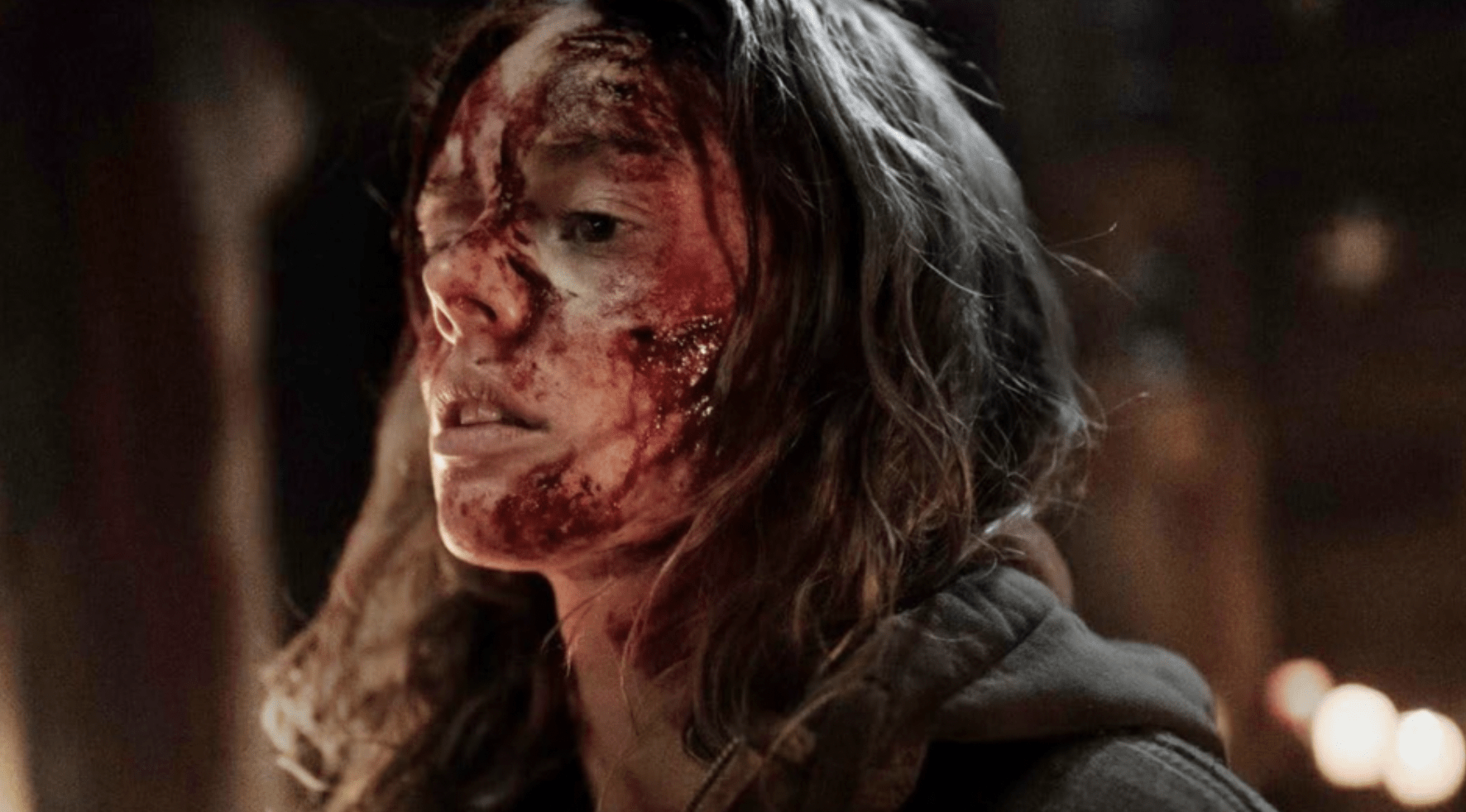It apparently goes without saying that Azrael (Samara Weaving) deserves to be sacrificed to appease the ancient evils that lurk in the forest she calls home. And when she disagrees with that verdict and makes a desperate sprint for her life, it also goes without saying that her sadistic captors will stop at nothing to re-claim her and satiate their spiritual yearning for blood.
Quite a few things go without saying in “Azrael,” E.L. Katz’s new horror film set inside a cult that takes great care to avoid the mortal sin of verbal communication. Save for a brief encounter with a very confused outsider, the entire film passes without a single English word being spoken. Sporadic title cards guide us through the folk religion at the center of the film’s mythology, using vague poetry to explain that our antagonists have eschewed language as a way of separating themselves from the human nature they feel so much existential guilt about possessing.
But while their strict moral code has deemed speaking to be an irredeemable evil, violent human sacrifice is very much still on the table. Their forest is filled with demonic shadow-dwellers, and the nameless cult has found a detente with them by offering up the life of the occasional young woman. And so this saga begins with the simplest of premises: the silent cult wants to kill Azrael, and Azrael wants to avoid being killed. So she runs.
Much of the film plays out like a lo-fi version of “Mad Max: Fury Road” that takes place entirely on foot. Save for a few brief moments when she dives into a cave or macabre log cabin to catch her breath and discover another horrifying secret, Weaving’s Azrael is constantly on the run from both the religious fanatics who want her dead and the monsters they serve. She covers enough territory to give us a decent understanding of the silent forest’s post-apocalyptic ecosystem, which contains human encampments with remnants of modern conveniences alongside manmade horrors that would be more at home in Puritan New England. As she learns more and more about the silent cult, her survival instinct gradually turns into a thirst for revenge.
What the film lacks in dialogue, it often makes up for in craftsmanship. The nightmarishly sludgy entities that pursue Azrael are one of the coolest practical creature designs that have come along in quite some time. Not quite human, not quite zombie, and not quite mummy, they’re the perfect embodiment of the vile nihilism that drives all of the film’s worst actors. The sound design is equally impressive, with layered foley effects capturing every crunch and crackle as Azrael dashes through mountains of brush. The meticulous audio works to strip many of the sequences of their operatic grandeur, adding to our immersion in this woman’s frenzied final grasp at freedom.
But there’s only so much that can be said about such a simple plot without spoiling it, which is both a testament to the film’s potential and an indictment of the finished product. When a film decides to sprinkle its exposition with such a light touch, it needs to nail every single detail of it in order to keep an audience invested. “Azrael” never finds its “Fury Road”-style introduction that forces us to buy into all of its silent spectacle. Without that, the stellar craftsmanship isn’t enough to squash the notion that “Azrael” is better viewed as a clever experiment than the visceral experience it wants to be.
But even if the execution isn’t always where it needs to be, Katz and screenwriter Simon Barrett still deserve their flowers for conceiving such a purely cinematic idea and swinging for it with so much confidence.When all is said and done, “Azrael” may well be remembered as a film that embodies the paradoxical elasticity of horror movies. No matter how much the tectonic plates of the film industry shift, the genre’s status as a sandbox for bold filmmakers to test out new ideas remains largely unchanged. But for all of the aesthetic and structural experiments that horror auteurs continue to dazzle us with, the things that truly scare us are timeless.
Katz and Barrett clearly understand that, because they centered their boundary-pushing filmmaking experiment around a premise that very well may have been told on the night that the first cavemen invented horror stories: a girl sees something scary in the dark corner woods, it runs after her, and she has to run faster. “Azrael” is a comforting reminder that even after seven million years, humans are still finding new ways to put their own spin on our first primordial fears.
Grade: B
“Azrael” premiered at the 2024 SXSW Film & TV Festival. Republic Pictures will distribute the film in North America.





